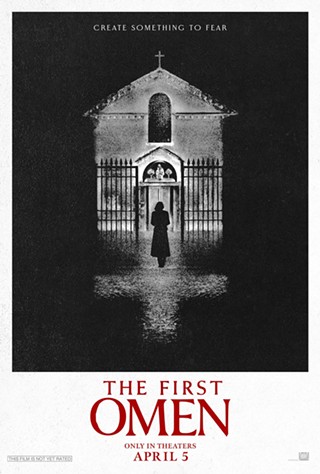IN THE EARLY '70s, commonly called "the last golden age of American cinema," directors like Bob Rafelson, Hal Ashby and Milos Forman made films about men who rebelled against a stifling establishment by "letting it all hang out." This theme reflected, in many ways, the lives of these directors: they were rebelling against the tired and staid big-budget formula films that had dominated American cinema in the early to mid-'60s. Then, just as auteurs like John Cassavetes started to expand this aesthetic into new areas, looking at women's experiences, blue-collar married life, and other non-rebelling-white-male-type motifs, directors like George Lucas and Steven Spielberg found that there was a lot more money to be made in films that featured giant mechanical sharks attacking planet-sized space ships. Thus ended the golden age.
Recently, with independent films cutting into the bottom line of the big studios, filmmaking has taken another turn. There are still plenty of gadgetocentric mechanical monster movies (such as that charming racist fantasy, Star Wars: Episode 1 -- The Phantom Asians) but they're being supplemented by human films like Rushmore and Election, which are not simply maudlin retreads of Love Story or Terms of Endearment, but are actually innovative and challenging cinema. Perhaps in a couple of decades we'll think of the last half of the '90s as another golden age.
The latest entry into what could be a new canon is the extremely well-made American Beauty. More than any of the other recent films of its caliber, it calls to mind those last-golden-age films, in that it is about a white man who suddenly realizes that his establishment life is painfully unpleasant. In response to what he calls "waking up," Lester Burnham (Kevin Spacey) starts to live the way he did the last time he remembered being happy: his teen years. He quits his advertising job, starts smoking pot again, and gets work at a drive-through burger joint.
First-time director Sam Mendes and first-time screenwriter Alan Ball (neither are raw youths; they've just been working in other venues) play a subtle trick with this quest for adolescence. Burnham's wife (Annette Bening) is played with a somewhat cartoony excess. She's a real-estate agent who listens to self-help audio tapes and stares in the mirror saying, "I will sell this house today...I will sell this house today." Burnham's neighbor is a retired Marine colonel (Chris Cooper) who beats his son for every minor infraction and spouts off in military talk about how disgusting homosexuals are. His wife, who barely speaks or moves, resembles a frozen, horrified version of the woman in the Grant Woods painting "American Gothic." All the adults are essentially two-dimensional cardboard cutouts.
On the other hand, Burnham's teenage daughter is multifaceted, having real concerns and a complex character. Her teenaged best friend and boyfriend are also complex, and seem to have notably genuine emotional reactions, whereas the adults behave in what seem to be pre-scripted ways to each event.
It's only when Burnham comes out of his stupor and descends into adolescence that he starts to develop complexity himself.
The film begins with Burnham's voice-over narration as he begins his day. "I don't remember always being this sedated, but there's always time to wake up," he begins, and closes with, "I'll be dead in a year...of course, I don't know that yet."
So, taking off from Sunset Boulevard, the film details, from a dead man's point of view, his attempt in his mid-40s to recapture his Clearasil years. Over the course of two hours that zip by, his transformation, and its effects on his immediate family, are recorded in crisp, sometimes fantastic visuals by veteran cinematographer Conrad Hall (of Butch Cassidy and the Sundance Kid and Coolhand Luke fame). American Beauty is billed as a comedy, and it has some big laughs, but none of them are there for their own sake; they all come through dialogue and action which expresses character or advances plot. Annette Bening's plastic-coated mother compliments her daughter's performance on the school dance squad by saying "That was great...you didn't screw up once." In the job description he's asked to write for the advertising firm that is about to fire him, Burnham says, "My job consists of masking my contempt for upper management and going into the bathroom to jerk off once a day while I imagine that I am not in hell."
As Burnham starts acting more like the heroes of the films of his youth, by speaking his mind and doing what he wants to do, his character actually becomes less selfish. He's no longer spending all his time protecting himself, so he starts to care about other people's lives and feelings. In this way it's a nice switch on those early '70s anti-establishment films, in that "doing your own thing" here is not an end in itself, but rather a way to open up to other people. It's a sort of mature, late '90s take on what might have been the right way to head out of the Me Decade.
Like Rushmore and Election, American Beauty is critical social commentary, but unlike those films it also has a positive message. It's unusual to see that in an intelligent movie at this point in cinema history; these days "edifying" films tend to be log-stupid collections of witless aphorisms (e.g., Forest Gump). On the other hand, smart movies tend to be deeply cynical. Breaking new ground (or perhaps retaking long neglected ground), American Beauty manages to be uplifting without giving up its critical position.
American Beauty is playing at Century El Con (202-3343), Century Park (620-0750) and Foothills Odeon (742-6174) cinemas.










